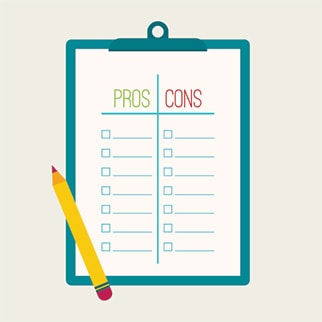Often when people are diagnosed with diabetes, they don’t want to tell others about it. But is this the best approach? It is a hard question to answer.
In this article, we will explore whether you should keep your diabetes a secret, or whether you should tell others about your diagnosis. There are some important things to consider.
We will look at all the pros and cons of telling, and not telling, others about your diabetes.
Contents
- The story of the little girl who saved her mother
- Things to consider if you want to tell others about your diabetes
- Pros of telling people about your diabetes
- Cons of telling others about your diabetes
- Who to tell
- What to do tell them and how much information to share about your condition
- Things to consider if you want to keep it a secret
- How to tell others
- Over to you
The story of the little girl who saved her mother
My colleague in public health, Amanda, was driving on a back road one day when she came up behind a car that was slowing down rapidly, and swerving. There were no other cars in sight, and it was a long way from town. Amanda was behind the car, as it swerved over the yellow line, and ran into the corn field. There it came to an abrupt halt.
Amanda was relieved that the car had veered off the road without hitting another car or a tree. She quickly pulled over, worried what she might find when she approached the vehicle. She ran to the car, and to her amazement, a toddler, not much more than two years old, sat in the back on a car seat, looking stunned, and calling out to her mother.
Amanda reassured the child that it was going to be ok, and helped her out of the car seat, and into her arms. She quickly went to check on the mother, who was passed out behind the wheel. Amanda called 911.
“Do you have any sugar,” she said.
“We got this, and we got this,” the child pointed.
“Ok,” said Amanda, grabbing the gel and rubbing it on the inside of the mother’s cheeks. Slowly, she was starting to come out of it. The paramedics arrived, and took her on the stretcher in the ambulance into town.
Amanda headed back into the public health department, and relayed the story of the low blood sugar, and the little girl who helped save her mother to her co-workers.
Things to consider if you want to tell others about your diabetes
Sometimes it’s challenging to tell others about your diabetes. Family and close friends may be one thing, but telling your work mates and acquaintances can be intimidating. We often wonder if others will judge us, or if they will treat us differently in any way. It’s not unreasonable to think that others might treat you unfairly, especially in the workplace, when they find out you have diabetes.
The 5 Stages of Grief, and how they relate to why you may not want to talk with anyone about your diabetes
Looking at Kubler-Ross’ “Five Stages of Grief,” people go through a whole host of emotions and feelings when they receive a diagnosis of diabetes. They may react as if they have had a loss, and in a way, they have. To them, they have lost a part of their health. So, it’s easy to understand why some people have a difficult time talking with others about their diabetes. You can read more about the stages of grief here: https://www.thediabetescouncil.com/7-stages-of-diabetes-grief/
Why do you need to understand the Kubler-Ross Stages of Grief when you have diabetes? It’s because it’s helpful to understand these stages, so that you recognize that how you are feeling is essentially a normal thing. Its part of the process where our brain needs the time to wrap around something as complex as diabetes, and grasp it.
These stages may also be the reason behind your reluctance in telling people about your diabetes. Why should you tell someone about something that you don’t have (denial), or something that makes you mad when you think about it (anger), or that which makes you want to put blame on others about your diagnosis (bargaining)? You could be feeling extremely depressed that it makes it hard to deal with it, or you could be at the level of acceptance where you are ready to learn about it. This means learning healthy ways to improve your blood sugar numbers to decrease the problems that you have from your diabetes.
I suggest reading the following articles as well:
If you are still in denial about your condition, and have not yet reached acceptance of your condition, it may be especially difficult to tell others, especially those that you don’t know very well. That’s another reason to understand what Elizabeth Kubler-Ross teaches us with her five stages of grief.1
Pros of telling people about your diabetes
What are the pros of telling at least some people about your diabetes?
There are quite a few reasons to tell people.
Let’s take a look…
People who know will be able to help you in case of an emergency
You may want to consider telling the person who knows you more than just a co-worker or an acquaintance. People who listen, and have a level of empathy are usually the best to confide in. Another person with diabetes, if you know any, can be great support, not only for confiding in, but for getting active.
Whether or not you tell many people, only a few, or you’re hesitant to tell anyone about your diabetes, may depend also on how private a person you are. If you don’t normally like to share much about yourself and there are few people that you share things with, then not sharing your diabetes could just be your natural response, based on your personality.
We don’t mean that you must tell every person that you meet on the street. Everyone at work doesn’t have to know, either. There are certain key people at work that should know about your diabetes, though. If you pass out from a low blood sugar, and no one around you knows that you have diabetes, or has been instructed what to do in this event, then you are on your own. That’s dangerous with a severely low blood sugar.
Conversely, your blood sugar could go too high, putting you into a diabetic coma, also known as diabetic ketoacidosis. As far as letting your boss know, they must follow the Disability Discrimination Act, and they really can’t discriminate against you. If they try, you can get legal help from ADA.
You will have someone who understands the highs and lows you are having
Pick those whom you trust, and have confided in before. This way, you know basically what their reaction might be. If they have been supportive of you in the past, then it’s likely they will also be supportive of your diabetes.
Those with diabetes who have more support, tend to do better, and have better outcomes related to their diabetes than those who don’t have any support, or who live alone. Handling the medical emergency that a severe low or high blood sugar may cause is the main thing that you want your close supports, such as family and close friends, to know how to handle. It is in these times that you may not be able to provide help for yourself. Having support for your diabetes can help you to live longer and healthier with it.
You will have a support system for when you feel sad or feel like giving up
Opening up to family, or other special people in your life is a good thing, and it can bring you much needed support, especially when you are going through finding out about a new diagnosis such as diabetes. Support can mean that they help you by not bringing in the wrong foods to temp you, by preparing you food that is diabetes-friendly, and encouraging you to walk or exercise by participating with you.
Your supportive loved ones can also remind you of things, like when to check your blood sugar, or when to take your medicine, if you want them to. It’s important to let your support people know what is helpful to you, and what feels like an invasion of your space. Sometimes, you may want to have certain things about your diabetes management kept to yourself. That’s fine.
If you are in a social setting, people will not pressure you to drink or eat outside your meal plan
If people know that you have diabetes, they may not try to tempt you into indulging in foods that are not good for you out in social settings. They will be supportive of why you are restricting yourself from eating certain foods and they may even try to make sure that there are foods that are diabetes-friendly at the social gathering, so you have options.
It is a great idea to take your own dish with you when invited to someone’s house or a gathering. If your host knows you have some dietary restrictions, you are more likely to find more food that you can eat when you get to their house.
Cons of telling others about your diabetes
When people don’t understand our diabetes, or they make comments that make us feel like it was our fault that we got diabetes, it can make us angry. No one wants to feel like people pity them, and though sometimes people mean well, it can come across as ill-intentioned.
You may even wonder how your spouse will react, and if they will be supportive. If you have had many personal experiences related to your own family and diabetes, you may be fearful of the same things happening to you that happened to your loved one. If you are self-conscious, or insecure about your diagnosis, you could have trouble telling others information about your condition that could help keep you safe.
For those you think may be judgemental, or not so supportive, you don’t have to tell those people. For example, if your aunt is particularly negative about most things, it’s likely that she will also not be so supportive here, so don’t tell her.
Finding the right time to tell the right people may be your biggest challenge. Some people, like those you live with, will need to know right away, in case of a severe low or high blood sugar, while others can wait to tell, or may never need to know at all. One example of this might be if you are in a new relationship, and just started dating someone, you don’t need to tell them until the relationship has moved farther along.
It’s best to talk with someone close to you in depth about your condition, how you are managing it, and what your numbers mean. The more the person understands that you are in charge, and doing well, the more they can feel secure about the diagnosis.2
It is a challenge to tell others
It’s a challenge to open up, and be able to tell others about your diagnosis. You don’t know how they will respond, what kind of pre-conceived notions they have about diabetes, or if they might treat you differently if you reveal it. Once the words have come out of your mouth, it’s too late to take it back.
That’s why people with diabetes will often only tell those closest to them. There is an expectation based on previous experience that tells you that someone you are close to can be trusted with the information.
Be prepared to respond to people without taking it personally
There’s no reason to take anything that anyone says about diabetes personally. Just use it as an “in” to educate them. It’s only natural for others, especially those that care about you, to have questions about your diabetes. If they say anything offensive, remind yourself that they are only human, and often people just don’t know what to say.
Chances are that you have been on the other side of it before, and have said an insensitive thing or two about something that you didn’t understand, so it’s important to give people the benefit of the doubt, and a break, sometimes.
You are afraid of people’s opinions, judgements about why you got diabetes, how to treat it, and how to prevent it
People will give you all kinds of advice about your diabetes. Someone will swear that vinegar will cure it, another will give you their grandma’s herb concoction. Everyone wants to help, but sometimes it doesn’t seem so helpful. It’s always best to get your education from the professionals. The thought of hearing other people give their unsolicited advice, or uncalled for judgements is enough to put some people off from telling others about their diabetes.
Unsolicited and ignorant comments
People tend to ask question, and say things that are not based in fact, or what I like to call, “diabetes myths.” They can be insensitive sometimes, and say things like, “Did you get diabetes because you gained weight.”
A good come-back might be, “I am overweight, which did put me at risk, but now I’m working on my weight, and having diabetes is giving me an opportunity to make a change.”
You may hear things like, “Did you get diabetes because you eat too much sugar?”
To this you could reply, “Everyone eats sugar, so I don’t have diabetes because I ate too much sugar. Let me explain to you about the different types of diabetes, and what causes diabetes.”
Yes, people can be uneducated about diabetes, and they can make you feel like a failure for having it, even when that’s not their intention. It can be really annoying to a person with diabetes when people start to question every bite of food they put in their mouths. Some people with diabetes may use this as an opportunity to teach the other person about diabetes.
Judgemental comments about diabetes can also be used to instruct others related to the different types of diabetes, how you get it (i.e. genetics) and to explain how eating healthy, exercising, and taking medication helps to treat your diabetes. There is misinformation out there about diabetes, and misinformed people make uneducated comments. Help be the one to raise awareness and understanding about the disease. 3
Who to tell
Telling everyone isn’t necessary, and it opens you up to judgments, comments, and misunderstandings. It puts you on the defensive of having to explain about your diabetes all the time, and that’s exhausting. It can also make you anxious having to worry about sharing your diagnosis.
Telling no one, on the other hand, may not be a great idea either. Someone has to know, in case you may need the help. There’s no reason for you to sneak around all the time, hoping for your diabetes not to be found out. That’s exhausting within itself.
To get the appropriate help in the event of an emergency, you have to let your confidant know what they need to do. Can they help you get your glucometer, and check your blood sugar? For that to happen, they would need to know where it’s located, and even how to use it.
Can they assist you with obtaining a fast-acting carbohydrate when you are having low blood sugar symptoms? They would need to know where you keep your stash of quick acting carbohydrates. Do you use a glucagon injection? You must then instruct those close to you where it’s located, and how to use it in the event of a severely low blood sugar. 4
At work (co-workers, employers)
People with diabetes can be just as good of an employee as anyone without diabetes. If they are responsible and self-managing their diabetes well, you will hardly know that they have diabetes. There are laws that protect them, but they may be working even harder to compensate for their diabetes. Some people with diabetes are exceedingly exceptional. Just check out our article on three Type 1s who climbed Mt. Everest.
You should let your close colleagues know about your diabetes, and instruct them what to do in case you were to have a diabetes emergency. These are the people who work in your immediate vicinity and who could get you help quickly.
Discrimination does exist. Anti-discrimination laws also exist, and you do have rights as a person with diabetes. Often, people with diabetes must seek advocacy when they are being discriminated against in the workplace due to their diabetes. There are laws that protect your rights. One such law is the ADA, or the American with Disabilities Act. The American Diabetes Association provides such advocacy, and you can call their anti-discrimination line at: 1-800-DIABETES (342-2383) or send an email to askada@diabetes.org. 4
Even with anti-discrimination laws in the workplace, people still do lose their jobs related to diabetes, and being afraid of discrimination is a real thing. People have lost promotions, been placed in less demanding positions related to their diabetes, and it’s hard to break through stereotypes that employers have about diabetes. Still, it can be done, and many people challenge work environments through the ADA.
You are under an obligation to make sure that your health is taken care of at work, and that if you do need help, someone knows what to do. If you were to have a safety issue related to your diabetes that caused yourself or someone else to be injured on the job, then you could face termination if you withhold information about your condition.
On the flip side, people with uncontrolled diabetes can have more days where they are out sick, and they have a greater risk of depression, which leads to increased absenteeism. This may be in part why some employers will try to discriminate related to the disease.
Partner
If you have a partner, then you need to let them know about your diabetes, and what to do to help you. You may be moody when your blood sugars are out of whack, so it’s good that your partner knows that you are not angry with them. They can help you get your glucometer, and check your blood sugar.
It could also affect how often you have sex, and even your performance in bed with your partner, so discussing these issues can alleviate fears. If you use a glucagon pen, anyone who knows about your diabetes, and spends time with you, should know how to give you a glucagon injection. They should know how to contact emergency services. It helps if your partner or spouse knows a good bit about your daily routine with diabetes. You can bring them to diabetes education class with you for support.
Going with you to at least some of your medical appointments will help them understand your condition better. In talking with the doctor, nurse, or Certified Diabetes Educator, they may feel more comfortable helping you handle your diabetes on a day to day basis.
Family
Diabetes is a family affair, and what affects one family member affects another. Often, adopting healthy behaviors together as a family is the best option, because diabetes also runs in families, and everyone can benefit from healthy lifestyle changes.
Close friends and family are often the most supportive. You should understand that those close to you will also go through the phases of grief along with you.
They may also be in a state of denial for awhile. They may be angry that their loved one is sick, they may bargain, and feel guilty.
They may not understand the disease, and have fears related to that misunderstanding. They, too, may benefit from diabetes education classes, and from support groups for people with diabetes and their families.
It’s best practice to tell those who you spend the most time with about your diabetes, so that they may aid you during an emergency if needed. Most of the time, at the least, you will let family and close friends know about your diabetes. To avoid situations in which you feel like you are always being nagged about everything about your diabetes, give clear expectations. If you can handle your own blood sugars, and don’t need one hundred reminders, say so.
Family members can help you with diet by vowing to eat the same meals and snacks as you do, within reason. The grocery shopper in the family can help by purchasing healthy foods, and leaving sugary foods, and high carbohydrate snacks on the shelf, and out of the family cabinets.
Family members should learn all about low blood sugar, and how to react and assist. They should learn the signs and symptoms, so that they may help to pick up on a low blood sugar early. They need to know that severe low blood sugars can lead to seizure, and even death, and how to react quickly to bring blood sugar up.
Friends
Close friends are easier to confide in than acquaintances. It’s not even necessary for you to tell most acquaintances, unless you feel that they will be a person that may need to help or assist you with your diabetes care at some point. Generally, unless they are close to you, spend time with you, or live close to you or work with you, then you don’t have to tell every friend and acquaintance that you have about your diabetes. 5
How do you determine who to tell?
Your intuition, and this article, should help you decide who to tell about your diabetes. You may use your best judgement, based on who you are close to, who your diabetes may affect, and who you live and work with.
There are plenty of topics to get the discussion going when you have diabetes. You will want to alleviate any myths or misunderstandings that the person has about diabetes. You will want to instruct them on the signs and symptoms of low and high blood sugar, and the treatment for each. If you take diabetes medications or insulin, it’s helpful to explain what they are for, and how they help you, and also how they could cause a low blood sugar if applicable to your medication.
Discuss the lifestyle changes that you have made, or will need to make related to your diagnosis. Talk about how the person can support you, or help you to accomplish your goals. 6
Things to consider if you want to keep it a secret
There will be situations when you would not want to let someone know about your diabetes. It is ultimately up to you to decide when you do tell people, who you tell, and how much you tell people, about your diabetes.
You don’t owe anyone any explanation
Remember that if you don’t feel like talking about your diabetes, you don’t have to. You don’t owe anyone explanations, but there are certain situations when your safety could be at risk if you don’t let someone know.
You have the right to your privacy
It’s important to remember that it is your personal health information, and it’s yours to share or not to share, but there are certain situations when it is a matter of personal safety, and even the safety of others.
You may not get the appropriate help in a timely manner if others don’t know what is going on with you in case of an emergency
Family members and friends need to know where the quick-acting carbohydrates are kept, and what kinds of carbohydrates are appropriate, and the amounts. Normally, fifteen grams of carbohydrates are required to raise a low blood sugar, but severely low blood sugars require glucagon injections, or medical attention, especially when insulin stacking is suspected, and insulin levels may be so high as to continually lower blood sugars. This makes it difficult to raise the blood sugar, and can be a medical emergency.
Don’t disclose unless you are required to by law
On some job applications, you can check yes or no for a disability, or you can check that you would rather not say. This is to protect you during the application process, as no one will know that you have diabetes until you are given the job. At that point, you may need to disclose certain information to certain key people who might assist you if you were to have a low or high blood sugar. If you don’t, it could be grounds for you to lose your and it resulted in an incident at work, where you or someone else was injured.
How to tell others
Telling others can be tricky. First of all, find a place and time where ample time is set aside for discussion, and the other person is given a chance to ask questions. Make sure to educate the person at this time, and alleviate any myths about diabetes that they may have. Go over your control, and how you are working to live healthy with diabetes.
Talk about the things that you are doing to take care of yourself, and how family or friends can help to support you in your efforts.
In person
If you are telling a person face to face, then you should look them in the eye, give them a chance to express themselves, ask any questions, and reflect on what you have said.
Online
There may be a time when you must tell someone online. For example, if you have relatives overseas, and calls are expensive. Possibly you are planning a trip, and you would like to try to stay on your plan as much as possible when visiting relatives overseas. Instead of sending an email, or a message, try Skype, or Facetime with your long-distance relatives. You will be able to see each other on the video screen, and there is opportunity for back and forth, instead of one way, and then waiting for a reply, such as with a message.
By wearing a medical ID
One way to let others know of your medical condition is by wearing a medical ID. These can even be tattoos. It could be a bracelet, or a necklace. It is whatever that you use to clearly identify your medical condition, and needs to be in a place where medical personnel will see it easily. It could also be an alert that pops up on your cell phone, or a card in your wallet to identify you as a person with diabetes. If you take insulin, or have Type 1 Diabetes, you will want this noted on your medical ID.
Children, and telling other people about their diabetes
Young children should know what to do in case a parent with diabetes were to have a low blood sugar, or a severely high blood sugar.
Children should also know how to contact medical services, and when it’s necessary. When your children have diabetes, it’s important to respect their rights to privacy of health information, as well. It may make them feel uncomfortable if you announce to the whole world that they have diabetes. Rather, give information that is needed to keep your child safe, and avoid singling them out because of their diabetes.
Telling others about your diabetes when you are a teenager
For teenagers, they may have a school nurse that they can go see and confide in. They should, but often don’t, have a 501 Plan at the school that outlines any accommodations that the school must provide them. These accommodations can include a standing hall pass for extra trips to the bathroom, as in the case of a high blood sugar, or for trips to the nurse’s office.
Teenagers who have Type 1 Diabetes, and use an insulin pump, may be uncomfortable informing their dates about their diabetes. Often, this is linked to a previous negative experience, where a date or someone that they wished to be important to, made them feel less than due to their diabetes.
Teenagers, for example, tend not to talk with adults or peers about the things that set them apart from the crowd. They are mainly interested in being accepted, so they may try to hide their diabetes from peers at school, at church, or out in the community. This usually stems from a fear of being seen in any way different, or set apart from the peer group. Peers may be supportive, and accept things when they find out that they have diabetes, or they may isolate the teenager with diabetes, and “bully” them, with online bullying the preferred way to do it these days.
Who do you tell about your diabetes if you are a college student?
For a college student, it can be hard entering a new environment, and taking care of their diabetes also. They may not want their roommates to know, or their new relationship interests. Again, as in high school, they may try to hide things about their diabetes, at least to certain people. It’s important that parents meet with the school health center, and make a college plan for diabetes care.
The Resident Director of the dormitory will need to know about the student’s diabetes. It’s a good idea to sit down with the new roommate, and other friends to go over the specifics of what diabetes are. You will want to go over the signs and symptoms of low and high blood sugar, and make sure everyone knows what to do.
It’s important to mention the effects of alcohol on blood sugars, as it can bottom blood sugars out if not taken with food. Other students on the hall need to know how the student with diabetes might act if they are having trouble related to diabetes, how to pick up on the signs and symptoms, and assist the student with diabetes, including giving a glucagon injection, if ordered.
Further reading:
Over to you
We hope that this article will help you decide who to tell, how you will tell them, who you will not tell, and what’s the best way to tell people about your diabetes. Let us know how it goes with the telling, or not telling, in the comment box below.
TheDiabetesCouncil Article | Reviewed by Dr. Christine Traxler MD on June 01, 2020
References:
- https://grief.com/the-five-stages-of-grief/
- http://www.diabeticlivingonline.com/newly-diagnosed/coping/i-have-diabetes-how-to-talk-about-it
- http://www.diabetes.org/living-with-diabetes/parents-and-kids/everyday-life/telling-others.html
- http://www.diabetes.org/living-with-diabetes/know-your-rights/discrimination/employment-discrimination/your-rights-on-the-job.html
- https://www.everydayhealth.com/hs/type-2-diabetes-guide-healthy-habits/things-tell-your-family/
- https://www.everydayhealth.com/hs/better-type-2-diabetes-control/sharing-your-diagnosis/
- http://www.diabetes.org/living-with-diabetes/parents-and-kids/everyday-life/telling-others.html











